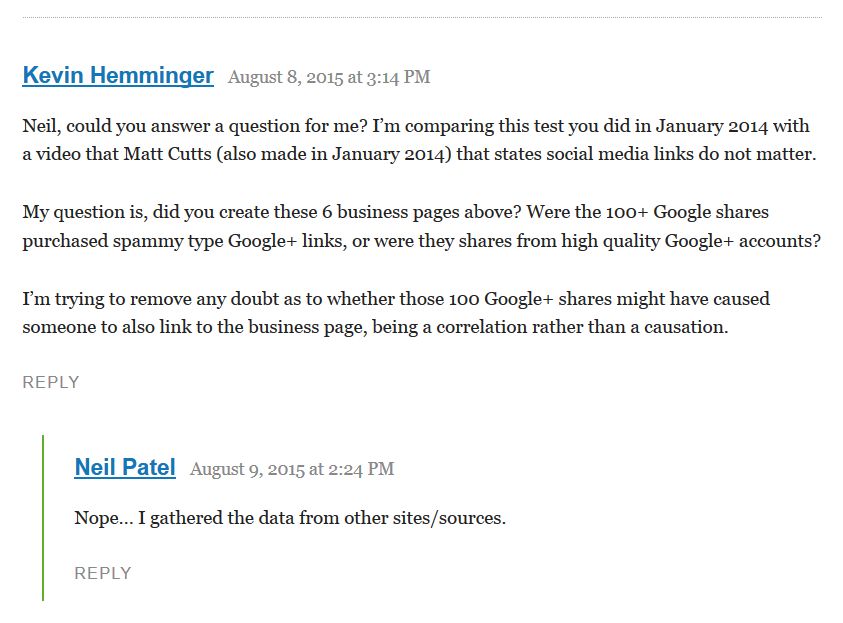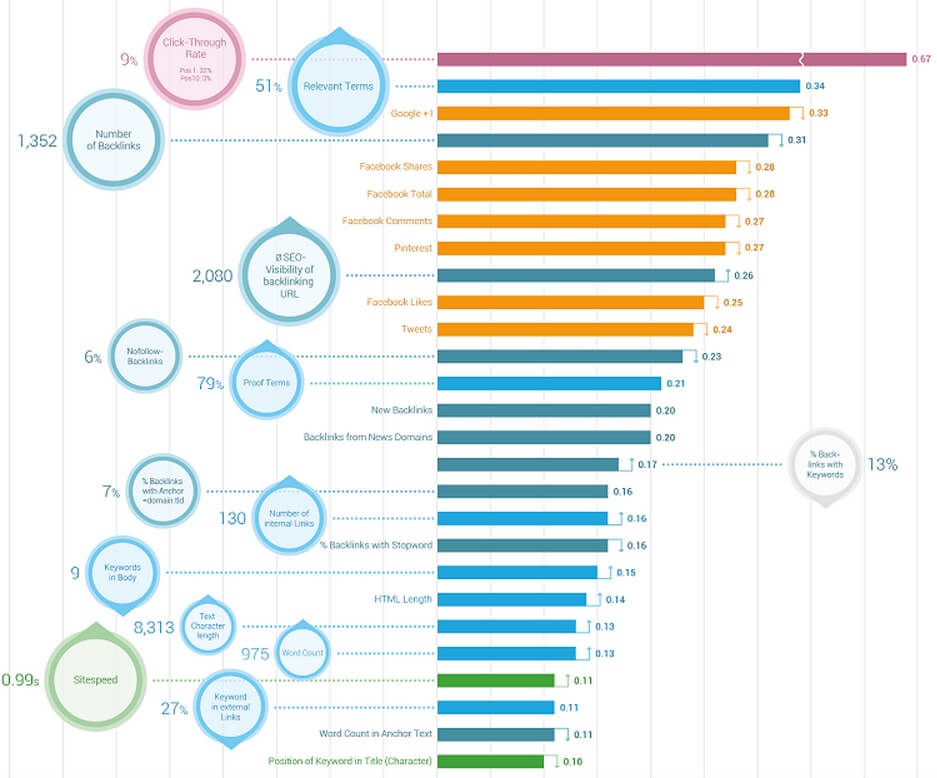Do Social Signals Help Rank Your Website?
I’m going to give my opinion upfront. I believe that social signals help your website to rank, both directly and indirectly. There are many indirect ways that doing well in social media will help you achieve higher rankings in Google. Through your social media interaction with others, your website is promoted, so opportunities for real people to link to your content is increased. The controversial aspect is whether or not social media tweets, favorites, shares and likes influence rankings. I believe yes, others disagree — I’m going to explain my position below.
But first, let me say that people say it doesn’t matter — and that if a page ranks better because it has likes and shares, it’s because that is an awesome page that people also happen to link to. In this video from Matt Cutts, he comes out and says that Google does not use signals from Facebook and Twitter. This video was dated January, 2014. This seems to be contradictory of my earlier statement, that the links do help you rank.
There is another January 2014 post about social media links that indicates the exact opposite of what Matt Cutts said. The article and infographic from Neil Patel gave very clear and quick relations between “a certain page got social media shares” and “it’s rankings thereafter exploded”.
Let’s address the “correlation doesn’t equal causation”. This theory is that a great page gets social shares, and it gets people linking to it, just because the page is awesome. This flies in the face of the experiment done by Neil Patel above where pages for six business were created, and one was given 100 Google+ visits. At this point, it is unknown whether or not those Google+ shares were made from high quality accounts or from fake, spammy accounts. If those accounts were spammy, I would say that this would be a case of causation, rather than correlation. I asked Neil Patel for clarification by leaving this comment on his post:
Neil, could you answer a question for me? I’m comparing this test you did in January 2014 with a video that Matt Cutts (also made in January 2014) that states social media links do not matter.
My question is, did you create these 6 business pages above? Were the 100+ Google shares purchased spammy type Google+ links, or were they shares from high quality Google+ accounts?
I’m trying to remove any doubt as to whether those 100 Google+ shares might have caused someone to also link to the business page, being a correlation rather than a causation.

Update: Neil Patel’s Response To My Comment
It will be interesting to see his response, as he is very diligent in responding to those who comment on his blog. At face value, however, it appears that this was an experiment, and the 100 shares on Google+ were purchased from someone who sells social links. If it turns out that a simple 100+ Google shares from spammy accounts created a rank increase, the case is made that the Google+ shares (and not whether those shares resulted in the page getting linked to) was the cause for the ranking increase.
Why would Matt Cutts, (at the time) the head of Google’s webspam team, say that social signals don’t count, when evidence points to the fact that they do count? First, I think that he gave himself plenty of wiggle-room in the video. He said “to the best of my knowledge” — as if he couldn’t actually know this for certain? How would Google’s webmaster relations spokesperson, and head of webspam, not know with an element of certainty whether social links matter or not in Google’s algorithm? It’s as if he’s creating plausible deniability for the disinformation he is about to spread.
We should keep in mind that Google has a history of operating without the best interests of webmasters in mind. Ever since the Panda algorithm was released, webmasters have been punished and prodded for acting in their own self interest, namely building links to their own website. Google’s goal is to make it easier for themselves to fight webspam. Certainly, if Matt Cutts were to say that social signals affect SEO, the cottage industry built around sending fake social signals would increase tenfold. The easiest way for Google to fight this is to create an environment of fear, uncertainty and doubt. In this case, the “doubt” is whether or not social signals increase rankings.

SEO Ranking Factors 2015
Google has a lofty goal of assigning something known as “author rank”. This isn’t the “Google authorship” that they discontinued last year. I’m talking about an attempt to ascertain who is the author of a particular article, and assign ranking signals to that article based on who the author is. Google’s Eric Schmidt, in his 2013 book “The New Digital Age”, said this about the topic:
Within search results, information tied to verified online profiles will be ranked higher than content without such verification, which will result in most users naturally clicking on the top (verified) results. The true cost of remaining anonymous, then, might be irrelevance.
At a conference in March of 2014, Matt Cutts said on stage that Google does have a form of “author rank” that they currently use at Google. Google’s algorithm, without a doubt, attempts to verify the authority of an author.
@marktraphagen to be fair, it does come into play in some ways. For example, in-depth articles use that data, I’m pretty sure.
— Matt Cutts (@mattcutts) March 12, 2014
In a video by Matt Cutts, he said the following about the subject of “author rank” (in the video, it starts around 4:45 seconds in):
We are doing a doing a better job of detecting when someone is sort of an authority in a specific space. It could be medical, it could be travel, whatever. And trying to makes sure that those rank a little more highly, if you are some sort of authority or a site that according to the algorithms we think might be a little bit more appropriate for users.
Understanding the direction that Eric Schmidt is wanting to head, and all of the relevance that social signals could provide in actually pinning down who an author is, and where they post — why would Google completely pass on using ranking signals passed from social media accounts?
Here is one theory. When someone ranks better because they have received links from social media sites, this elevates the author of that content being linked to. In the end, it is not directly the social link that causes the increase in rankings, but the author rank that was elevated by the social links. In cases where Google cannot make a determination of who is an author of a page, social media links may not help at all. In this way, it is not directly the social media links that are causing the ranking increase, so Cutts can claim that they aren’t used directly for ranking a page, but indrectly through the elevation of author rank.
In any event, participation in social media is good for establishing your brand. It most likely is one of those “200 factors” that Google considers when establishing where a site should appear in the SERPs. I have noticed that Google is much more forgiving of sites that have strong social signals. Finally, social media participation provides traffic to your website, regardless of any ranking changes they may or may not help with. I highly recommend increasing your social media presence.


Comments